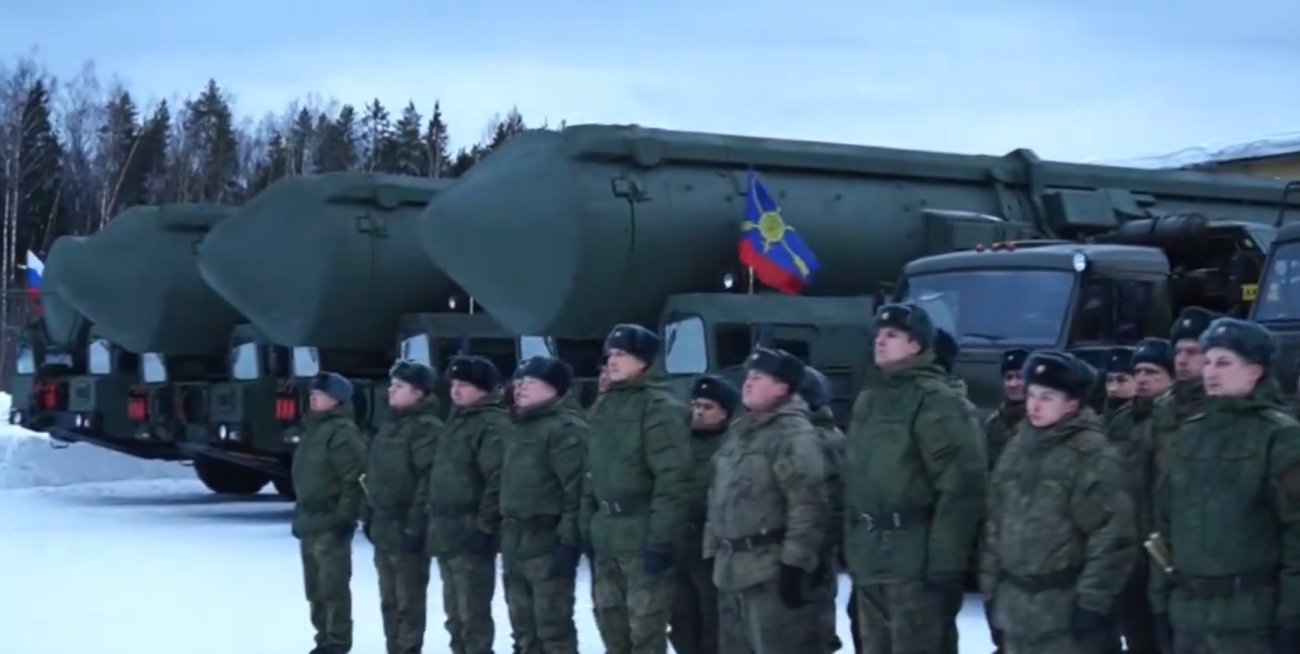Unlike last year’s muted Victory Day Parade in Moscow, this year’s edition could see the Yars mobile ground-based missile systems. Does that signify that President Vladimir Putin plans to flex his military muscle?
In a spectacular display of military might, a convoy of Yars mobile ground-based missile systems (PGRK) marched from the Ivanovo region to a training ground near Moscow, gearing up for a monumental presence at the upcoming May 9 military parade on Red Square.
The mechanized column, consisting of Yars missile launchers, made the journey to Alabino in the Moscow Region, covering a distance of approximately 400 kilometers across the Ivanovo, Vladimir, and Moscow Regions, as reported by TASS, citing the Russian Ministry of Defense.
This deployment marks a crucial step in preparation for the annual Victory Day Parade, a significant event commemorating the victory of the Soviet Union over Nazi Germany in World War II.
The RS-24 Yars missile system is a cornerstone of Russia’s strategic defense capabilities, featuring both mobile and silo-based solid-propellant intercontinental ballistic missiles equipped with multiple independently targetable vehicle (MIRV) warheads.
🇷🇺🪖⚡: #URGENT#Russia: Strategic Missile Forces with Yars (RS-24) intercontinental (ICBM) nuclear missiles in central Moscow conducted currently maneuvers in central Moscow. https://t.co/SwXbLvdWoI pic.twitter.com/DjHQTx5d5o
— OSINT Expert (@OsintExperts) February 27, 2024
Russia initiated the deployment of Yars Intercontinental Ballistic Missile (ICBM) systems in 2009 when the Yars launcher was accepted for experimental combat duty within the Strategic Missile Force.
It was developed by the team of the Moscow Institute of Thermal Engineering under the leadership of General Designer Yuri Solomonov.
According to the Defense Ministry, the convoy’s journey involved traversing major transportation routes, including federal highway M7 and the Moscow Automobile Ring Road.
This logistical feat required careful coordination and planning to ensure the safe and timely arrival of the missile systems at their destination.

During the preparations for the military parade on Moscow’s Red Square, personnel from the Ivanovo Region underwent rigorous training and qualification tests alongside the crews of the Strategic Missile Force’s parade team.
The tests included specialized training sessions and driving exercises with the Yars road-mobile missile launchers in convoy formation at an autodrome.
Following a thorough evaluation process, which assessed the readiness and capabilities of the personnel and equipment, the commission of the Strategic Missile Force’s military command and the Vladimir missile formation approved their participation in the parade preparations.
“Personnel and equipment of the Teikovsky missile formation have been taking part in military parades on Red Square in Moscow since 2008,” the Russian Ministry of Defense said.
Why Does Russia Celebrate Victory Day On May 9?
Victory Day, commemorating the Soviet Union’s triumph over Nazi Germany in 1945, stands as Russia’s most significant celebration, although it was subdued last year amid the ongoing conflict in Ukraine.
Historically, Victory Day traces back to May 8, 1945, when Nazi Germany’s unconditional surrender was recognized by France, Britain, and the United States as “Victory in Europe Day.”
However, in Moscow, where it was already May 9 due to the time difference, this momentous occasion became known as the Soviet Union’s “Victory Day.”
Since then, Victory Day has held profound significance for Russians, commemorating the sacrifices of millions during the “Great Patriotic War.” The first victory parade, presided over by Soviet leader Josef Stalin, took place on June 24, 1945, showcasing captured German symbols as symbols of triumph.
This year will mark the 79th anniversary of Russia’s victory, a milestone fraught with both historical reverence and contemporary tensions. President Vladimir Putin has consistently utilized Victory Day to reinforce a narrative of Russian strength and resilience, aligning the nation with the legacy of defeating fascism.
Putin’s rhetoric, however, has been met with skepticism, particularly concerning Russia’s involvement in the conflict in Ukraine.
Since the full-scale invasion in February 2022, Putin has drawn parallels between the ongoing conflict and the fight against Adolf Hitler, a comparison vehemently rejected by Ukraine and its Western allies.
Last year’s Victory Day celebrations offered a stark departure from tradition. The grandeur of the usual parade outside the Kremlin on Red Square was notably muted, with only one old Soviet tank on display and the absence of modern military equipment.
Local parades were also canceled, and the nationwide Immortal Regiment march, a poignant display of familial remembrance, was called off.
Analysts speculated that the Kremlin’s decision to scale back festivities might have been driven by a desire to avoid large gatherings amid heightened tensions. There were concerns that such gatherings could inadvertently highlight the human cost of the conflict, which the government has sought to downplay.
As Russia prepares to commemorate Victory Day once again, the nation finds itself at a crossroads, grappling with historical legacies and contemporary challenges amid the ongoing war with Ukraine.
- Contact the author at ashishmichel(at)gmail.com
- Follow EurAsian Times on Google News